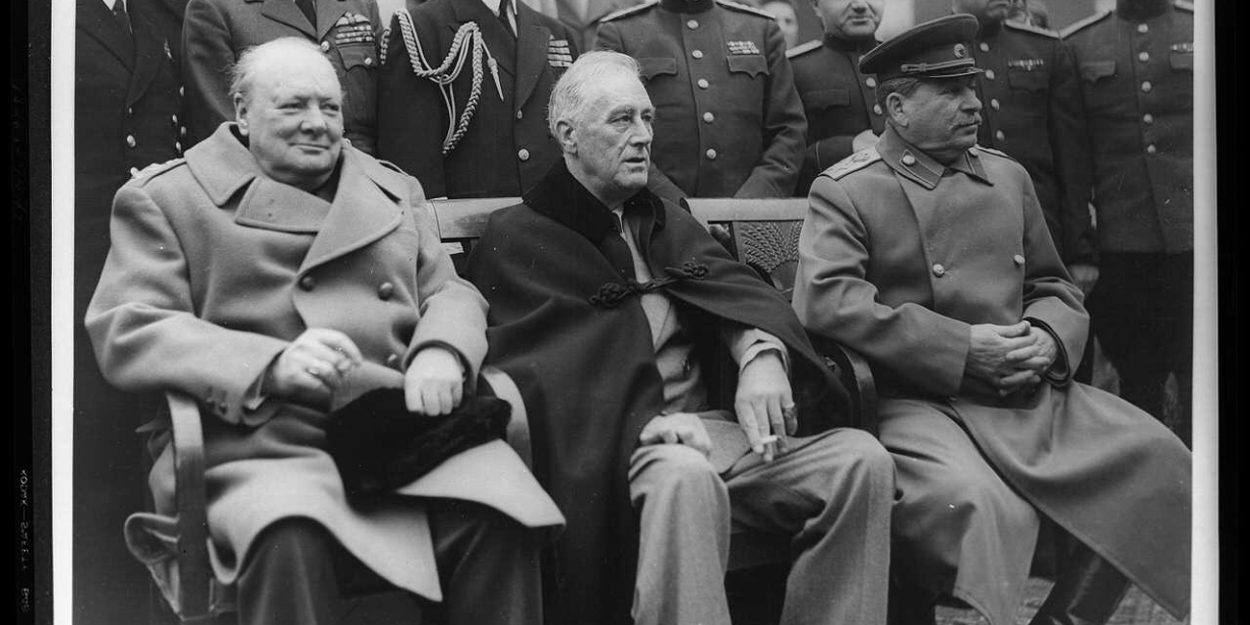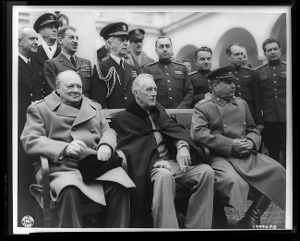Feature: BIG TROUBLE AT LITTLE YALTA at Just Off Broadway Theatre
A Comedy on The Vagaries of Power - What could go wrong?


February 1945.
Photo courtesy of the Labrary of Congress
BIG TROUBLE AT LITTLE YALTA is a comedic take by Neil Salvage on a not very well remembered, but extremely important meeting of world leaders during the waning days of the World War II in Europe. Almost all of what you see in the play is fiction, but a little understanding of what really transpired may help you understand and appreciate the comedy playing out in front of you.
The date was early February 1945. The Allies had landed in Europe. The Americans and the Brits had triumphed at the Battle of the Bulge. The Soviets had pushed the Germans back and were now camped forty miles east of Berlin. The U.S. Eighth Air Force was breaking German spirits with thousand- airplane daily bomb raids on German Cities. Germany must soon surrender.
The American President Franklin Roosevelt asked for a meeting of the major allied leaders at a neutral site away from the fighting to discuss next steps. Roosevelt had originally proposed a meeting on Malta. Russian Leader Joseph Stalin counter suggested the Crimean resort city of Yalta on the Black Sea. In truth, Stalin did not trust airplanes and he had a summer palace in Yalta, anyway. It was agreed.
Franklin Roosevelt, Prime Minister Winston Churchill, and Joseph Stalin met and carved up the spoils of the war just ending. Their hope was that a new organization of nations might forestall new World Wars from breaking out.
Each leader had his own agenda. The five-and-a-half year war had taken a physical toll on each man. Each man’s blood pressure was seriously out of control. Photos of Roosevelt (never a well man) show him seriously diminished, with hollows in his cheeks and dark circles under his eyes. He had just been elected to his fourth consecutive term as President. He was sixty-three years old. In fact, Roosevelt survived this meeting only several more months.
FDR died in April 1945. Stalin died of a stroke in 1954. Winston Churchill’s tenure as prime minister barely survived the war. He was removed in May 1945. The man himself survived his booze, and his stogies until 1965 when he passed away also of a stroke in 1965 at age 91.
Franklin Roosevelt was concerned that the US military would be forced to invade and conquer Japan. It was feared that the operation might cost the lives of a quarter million Americans and millions of Japanese. Roosevelt did have a secret ace in his back pocket. He knew that America would soon have an atom bomb, but at this point the President could not be sure the device would work until test detonation scheduled for July 1945. No one could be certain about the level of resistance yet to be administered by Japan.
With the horror of an invasion of terrible size in the offing, Roosevelt wanted an assurance from his European Allies that they would participate in the Japanese invasion. He also wanted something additional. Roosevelt wanted Stalin’s assurance that the Soviet Union would participate in a fledgling United Nations.
A United Nations was an idea that had been gestating for a generation. The first attempt was the League of Nations after The Great War. It failed. The idea was revived in early 1942 when representative of the nations warring against the AXIS met in Washington for the signing of The Atlantic Charter. A similar meeting in Quebec, Canada in 1943 called for an organization of nations to prevent further wars.
President Roosevelt met with Premier Stalin at Tehran, Persia in November 1943 and agreed to the skeleton of the organization.
Churchill’s goals largely mirrored those of the United States. He was concerned with the continuation of the British Empire and the expansion of democratic values in western Europe and in Poland.
Stalin was more concerned with physical gains of territory, influence over eastern Europe in what he called spheres of influence, some control over Poland, and the independence of Mongolia. He also extracted title to certain islands off Japan that Russia had owed previous to the Russo-Japanese War.
Everyone got what they wanted and the haphazard division of responsibility has held back a major war for more than eighty years. Parts did not work out as intended.
This little drawing room comedy looks at how the sausage get made (more or less) in grandeur of Russian state rooms.
All three men smoked like chimneys. Roosevelt smoked cigarettes in fancy holders, Stalin puffed on a pipe, and Churchill was famous for his trademark stogie stuffed in the corner of his smooth. All three men liked to imbibe. Rosevelt’s drink of choice was Bourbon or a dry martini. Stalin liked Vodka. Churchill was, of course, a Scotch fan.
Against the history just related, everything in this play is just made up and hopefully shines a light into the way we believe powerful people think. Take from it what you will. What could possibly go wrong?
BIG TROUBLE AT LITTLE YALTA opens at Just-Off Broadway Theatre at Kansas City on July 4,5,6,7. This is a World Premiere engagement. Tickets are available at www.cstkc.com.
Each performance will be followed by a champagne talk back session. Audience input is solicited in the development of this significant piece of art.
BIG TROUBLE AT LITTLE YALTA is written by Neil Salvage who also plays Winston Churchill. Franklin Roosevelt is played by Bob Paisley. Nicolas Collett plays Josef Stalin.
Comments
Videos

